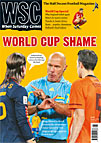 Some are puzzled by England's poor performances while the Premier League grows ever richer and more powerful. But, as Tom Davies argues, these facts are very closely linked
Some are puzzled by England's poor performances while the Premier League grows ever richer and more powerful. But, as Tom Davies argues, these facts are very closely linked
All modern World Cups are accompanied by nostalgia for earlier tournaments, but for England the build-up to this one was more resonant than most, 20 years on from the last truly gripping campaign by the national side. How far we’ve failed to come.
It was resonant too because in the aftermath of that tournament, and the explosion of public interest in the game that followed, a far-reaching document was published by the English game’s governing body that promised “a pyramid of playing excellence with the England team at its apex”. The FA’s Blueprint for the Future of Football, published in 1991, talked of a slimmed down 18-team top flight that provided the scope for the national team to advance. It brought us the Premier League, the Frankenstein’s monster that has loomed large over every campaign since.
Those pretensions of concern for the national team did not last long. The FA’s then-chairman Bert Millichip swiftly sold the pass on the 18-team size of the league, setting the tone for the Premier League to get its way in most conflicts over football’s governance ever since, contributing to – while blaming all problems on – the FA’s administrative sclerosis.
Such is its power and wealth, however, that it can pose as a success story even now, after an England campaign that had the Premier League’s DNA stamped through it. Acres of media coverage have since been generated on why England failed again, plenty of it thoughtful, a good deal of it nonsense.
A nadir was reached on Newsnight the evening after the mauling by Germany, in which a thoughtful piece by economics correspondent Paul Mason comparing English football to Lehman Brothers was followed by a discussion of point-missing inanity involving Wigan chairman Dave Whelan and comedian Mark Watson (because the bloke off the pear cider adverts is the obvious go-to guy for fan opinion). Whelan, meanwhile, seized the opportunity to promote his own hobby horse – that the Premier League should “take over” the England team.
Given that the FA body in charge of the national side, Club England, is already chaired by the Premier League’s chairman, Dave Richards, it was a curious suggestion, but it proved helpful in pushing the idea that the Premier League is the English game’s dynamic powerhouse while the FA’s blazers flounder.
We saw it too in the head-scratching around the performances of Frank Lampard, Steven Gerrard, John Terry and Wayne Rooney. These players “do it week in week out” in the “best league in the world”, so why can’t they do it for England? Count the lazy assumptions in all that lot, prime among them that other countries’ players aren’t “doing it week in week out” in other, perhaps better, leagues. That none of England’s squad plays in those leagues strengthens this parochialism, a parochialism undimmed by the cosmopolitan make-up of our top flight.
So Diego Forlán is prefixed with tiresome regularity with the words “former Manchester United misfit”, as if this brief period is the defining spell of a career rich in achievement. There remains a fog over the Channel, from which other leagues’ footballers are cut off. Lampard and Terry’s final game of last season in the “uniquely competitive” English top flight, meanwhile, was an 8-0 romp against Whelan’s club, Wigan.
To blame all failure on the Premier League is simplistic, but it’s hard to see why we should be surprised that the way the league operates, and what it prioritises, has produced anything but the unwatchable failures of recent tournaments. The Premier League’s main preoccupations are market expansion, instant results and debt servicing – long-term development struggles for a look-in.
Should we care? England has always been a club-before-country place, which has helped give us an enviably vibrant domestic culture. If we’re honest, those of us who opposed the Premier League’s formation did so more from concern for its effect on our own, smaller clubs than on the England team, while plenty of those gnashing and wailing post-Bloemfontein will have forgotten it all when the next Super Sunday comes round.
But in England’s failure – at the end of a season that exposed the Premier League’s systemic failings – there should be an opportunity for radical change. So let’s think the unthinkable. The Premier League should not take over the running of the England team. It should cease to exist. Professional football should be run by one body. The arguments against its existence are as strong now as they were 19 years ago. The FA produced its Blueprint partly to win a power struggle with the Football League, only to give birth to an organisation that would lock it into an even more intractable one.
Nothing symbolised England’s mess more than Fabio Capello’s first professional assignment in the aftermath of the Germany defeat. It was a meeting about the future with Club England chairman Richards, who as a club chairman oversaw Sheffield Wednesday’s sharp decline. One of these men has presided over failure at all levels of the game, over two decades. The other has presided over failure at one level, over a couple of months. So it was obvious whose job would be on the line. For this is England, and this is how we do business. And business is all that matters.
From WSC 282 August 2010